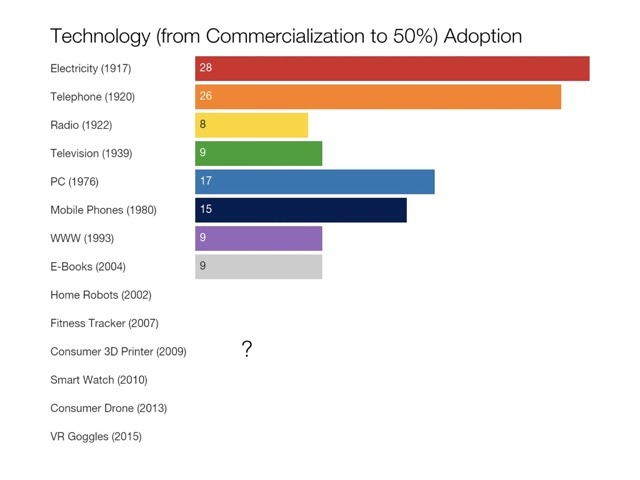Posts tagged technolgy
“Most people who work in tech – 99% – don’t want to look at the implications of what they are doing. They just want to hit their milestones and that’s it.” But there’s no turning back. The internet is here to stay and will continue to profoundly change societies and the workplace. “If the internet stopped one day, can you imagine the chaos? What would we call that scenario? It’s called 1995 – that’s how far we’ve come.”
via https://www.theguardian.com/small-business-network/2017/mar/30/douglas-coupland-the-nine-to-five-is-barbaric
“There often are competing claims as to who invented a technology and when, for example, and there are early prototypes that may or may not “count.” James Clerk Maxwell did publish A Treatise on Electricity and Magnetism in 1873. Alexander Graham Bell made his famous telephone call to his assistant in 1876. Guglielmo Marconi did file his patent for radio in 1897. John Logie Baird demonstrated a working television system in 1926. The MITS Altair 8800, an early personal computer that came as a kit you had to assemble, was released in 1975. But Martin Cooper, a Motorola exec, made the first mobile telephone call in 1973, not 1983. And the Internet? The first ARPANET link was established between UCLA and the Stanford Research Institute in 1969. The Internet was not invented in 1991. […] Economic historians who are interested in these sorts of comparisons of technologies and their effects typically set the threshold at 50% – that is, how long does it take after a technology is commercialized (not simply “invented”) for half the population to adopt it. This way, you’re not only looking at the economic behaviors of the wealthy, the early-adopters, the city-dwellers, and so on (but to be clear, you are still looking at a particular demographic – the privileged half.)”
–The Best Way to Predict the Future is to Issue a Press Release. Audrey Watters.
Five years ago, Matthew Kirschenbaum, an English professor at the University of Maryland, realized that no one seemed to know who wrote the first novel with the help of a word processor. He’s just published the fruit of his efforts: Track Changes, the first book-length story of word processing. It is more than a history of high art. Kirschenbaum follows how writers of popular and genre fiction adopted the technology long before vaunted novelists did. He determines how their writing habits and financial powers changed once they moved from typewriter to computing. And he details the unsettled ways that the computer first entered the home. (When he first bought a computer, for example, the science-fiction legend Isaac Asimov wasn’t sure whether it should go in the living room or the study.)
via http://www.theatlantic.com/technology/archive/2016/06/how-to-write-a-history-of-writing-software/489173/
A poorly-named Wi-Fi hotspot sparked a security scare on a Qantas flight and prompted about 50 terrified passengers to refuse to fly. The hotspot name - Mobile Detonation Device — was spotted by a female passenger who saw it on her phone’s Wi-Fi menu before the plane left Melbourne airport.
via http://www.telegraph.co.uk/news/2016/05/02/wi-fi-hotspot-named-detonation-device-causes-bomb-scare-at-melbo/
I buy my staple food online like a civilized person. It takes me mere seconds to order enough soylent for a month, and version 2.0 does not require any preparation, so I got rid of my noisy blender. At less than $2.50 / meal it also saves me loads of cash, and I appreciate the use of more soy and less rice, finally bringing a nutritionally optimal PDCAAS score of 1.0 while improving the taste and especially texture. I also think it’s crazy cool that some of the ingredients are made by algae rather than water-guzzling pesticide-spraying farms. […] I enjoy doing laundry about as much as doing dishes. I get my clothing custom made in China for prices you would not believe and have new ones regularly shipped to me. Shipping is a problem. I wish container ships had nuclear engines but it’s still much more efficient and convenient than retail. Thanks to synthetic fabrics it takes less water to make my clothes than it would to wash them, and I donate my used garments.
http://robrhinehart.com/?p=1331
I admire Ray Kurzweil’s advocacy of radical ideas. However, like so many scientists and tech mavens he has never been able to frame the essential humanistic components of his master plan in a compelling way. When you promote powerful notions of human transformation it obviously becomes important not to portray humanity as something that must be overcome. Therefore it would seem to be essential to include a Future Humanities department as part of the Singularity University’s curriculum.
http://spacecollective.org/rene/4708/The-universe-will-fly-like-a-bird
Amidst the swirling maelstrom of technological progress so often heralded as the imminent salvation to all our ills, it can be necessary to remind ourselves that humanity sits at the center, not technology. And yet, we extrude these tools so effortlessly as if secreted by some glandular Technos expressed from deep within our genetic code. It’s difficult to separate us from our creations but it’s imperative that we examine this odd relationship as we engineer more autonomy, sensitivity, and cognition into the machines we bring into this world. The social environment, typified by the contemporary urban landscape, is evolving to include non-human actors that routinely engage with us, examining our behaviors, mediating our relationships, and assigning or revoking our rights. It is this evolving human-machine socialization that I wish to consider.
http://www.urbeingrecorded.com/news/2012/06/27/extended-senses-invisible-fences/
Disruption created by intentional generation of fake GPS signals could have serious economic consequences. This article discusses how typical civil GPS receivers respond to an advanced civil GPS spoofing attack, and four techniques to counter such attacks: spread-spectrum security codes, navigation message authentication, dual-receiver correlation of military signals, and vestigial signal defense. Unfortunately, any kind of anti-spoofing, however necessary, is a tough sell.
http://www.gpsworld.com/gnss-system/signal-processing/straight-talk-anti-spoofing–12471
